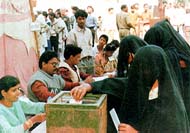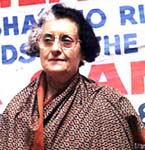Commentary/Vir Sanghvi
Should seats in Parliament be reserved on the basis of gender?
 I am sorry. I've tried my best. But I still remain unconvinced of the merits of the case for reserving parliamentary seats for women. it is not as though I am against the proposal; just that
I remain ambivalent. And unfortunately, such is the self-righteousness of those demanding reservation that they do not regard it as necessary to try and persuade anybody that they are right. Rather, they
take the line that anybody oppose to reservation is also opposed to women and therefore, beneath contempt.
I am sorry. I've tried my best. But I still remain unconvinced of the merits of the case for reserving parliamentary seats for women. it is not as though I am against the proposal; just that
I remain ambivalent. And unfortunately, such is the self-righteousness of those demanding reservation that they do not regard it as necessary to try and persuade anybody that they are right. Rather, they
take the line that anybody oppose to reservation is also opposed to women and therefore, beneath contempt.
As far as I can understand it, the case rests on several propositions.
The first is that Indian women are a disadvantaged grouping and
therefore deserving of some special consideration. I have no real
problem with this proposition. But it is from the next step onwards
that I begin to get more than a little bewildered.
The second key proposition is that the way to advance the cause
of women is to ensure that lots more women occupy positions of
political influence.
At first, this doesn't sound unreasonable but the more I think
about it, the weaker this formulation seems to me.
It makes the assumption that women in positions of power will
help other women. But will they? Do men in power actually help
other men? What reason is there for believing that any powerful
women will put herself out for her sisters?
Let us take the case of the single-most powerful prime minister
India has ever had: Indira Gandhi. From 1966 to 1977, Mrs Gandhi
spent 11 years in power during her first term. And from 1980 till
her assassination she was the leader of the party in power; a party that called
itself the Congress (I) after her.
 This achievement cannot be minimised. Mrs Gandhi took office 13
years before Mrs Thatcher and assumed a political importance that
few women have achieved in the West even today. A woman has never
been elected president of the United States or of France.
This achievement cannot be minimised. Mrs Gandhi took office 13
years before Mrs Thatcher and assumed a political importance that
few women have achieved in the West even today. A woman has never
been elected president of the United States or of France.
You could argue that Indira made it to the top in 1966 because
she was Pandit Nehru's daughter. But the 1971 and 1980 victories
were entirely her own.
And yet, did Indian women benefit substantially during her reign?
Were they significantly better off in 1984 than they were in 1966
as a consequence of anything she did? Did she even regard it as
part of her responsibility to be especially concerned about women?
If the argument is that all women benefit when some occupy positions
of influence, then why didn't it happen in Tamil Nadu when Jayalalitha
was chief minister? In Orissa when Nandini Satpathy ruled? And
so on.
You can't respond that this was because they were untrue to the
cause of women. If every Indian woman in politics is untrue to
this cause, then what reason is there for believing that those
who will get an assisted entry into Parliament will be any different?
And perhaps this is how it should be. The basis of parliamentary
democracy is that a representative represents all his or her constituents.
Men aren't elected to help men. And women aren't elected
to help women. Both are elected to help everybody.
Take the argument that the way to, help all women is to place
women in positions of influence and substitute 'women' with 'Muslims'
or 'banias' or 'harijans' and you will see how dangerous it is.
 When Muslims vote as Muslims, we worry that they are not voting
as Indians, Why, we ask, can't they vote for a Hindu? Do they
believe that all national politics should boil down to a single-point
agenda: vote for our own kind? When 'banias' appeal to other banias
only on the grounds of caste, we say that it is a symptom of an
immature democracy.
When Muslims vote as Muslims, we worry that they are not voting
as Indians, Why, we ask, can't they vote for a Hindu? Do they
believe that all national politics should boil down to a single-point
agenda: vote for our own kind? When 'banias' appeal to other banias
only on the grounds of caste, we say that it is a symptom of an
immature democracy.
And yet, in this case, we believe that the best way to ensure
that women's interests are protected is to change the law to exclude
men from being elected!
Does that make much sense?
Nor is it necessarily correct to say that women believe that they
will only progress if other women represent them. Take the example
of the West. Few would deny that American women are as politically
aware as American men. And yet the proportion of women in the
Senate is not significantly different from the number of women
in the Lok Sabha.
If you claim that the low proportion of female Indian MPs is a
symbol of the backwardness of Indian women, then what about America?
Why don't those educated, politically aware women elect more female
senators?
Could it be because they don't believe that the only way
ahead is to vote on the basis of gender?
Take an Indian example. Kerala is one of India's most literate
states. Female literacy is staggeringly high and society is matriarchal.
Yet, the proportion of women in state politics is not much higher
than in say, Gujarat or Rajasthan.
Perhaps educated women voters don't necessarily want to be represented
only by women. Perhaps they can see beyond gender even if those
pressing for reservation are not willing to do so.
And finally, there is the whole business of the double standards
on reservation.
Until the demand for reserving seats for women caught on,
most educated middle class women
would say that they were against reservation. They believed that
the scheduled caste/tribe reservation should be phased out. And
when V P Singh introduced the Mandal proposals, they were outraged.
Today, many of the same women are supporting reservation of parliamentary
seats for women. And they are dredging out the same arguments
they rejected during the Mandal debate.
They claim that the proportion of women in Parliament is significantly
lower than the percentage of women in the population - and so,
we should change the rules of the electoral system to ensure a
near parity.
But the percentage of Muslims in Parliament is also lower than
the proportion of Muslims in the general population. So is the
proportion of Dalit Christians. And so on.
Are we going to keep changing the electoral system until we achieve
demographic parity through reservation? If you accept the case
for reservation for women then you are logically bound to accept
the proposition. Consistency demands that you extend the principle
to all groups, not just to women.
But, I suspect, few of us are prepared to agree to that. Muslims
have asked for reservation for years on exactly the same grounds:
they are disadvantaged; political parties don't nominate enough
of them; the more Muslims there are in power; the better off
the general Muslim population will be, etc.
 Each time, their demand has been denied. We have explained that
we are not anti-Muslim; just anti-reservation. We said the same
to the Mandalites. And we repeated it to Dalit Christians. When
politicians did not listen to us, we damned them as venal and
opportunistic.
Each time, their demand has been denied. We have explained that
we are not anti-Muslim; just anti-reservation. We said the same
to the Mandalites. And we repeated it to Dalit Christians. When
politicians did not listen to us, we damned them as venal and
opportunistic.
But now many educated women have turned those arguments on their
heads. They have completely abandoned the principles that they
professed only a couple of years ago.
Why is this? Is it because they smell a chance to grab some power
for themselves; a chance to get into Parliament?
I hope not. I hope there is a convincing rebuttal to the arguments
I have raised. And, I hope that some supporters of the proposal
will finally take the trouble to convince those of us who remain
ambivalent.
Vir Sanghvi is editor of Sunday magazine
|





 I am sorry. I've tried my best. But I still remain unconvinced of the merits of the case for reserving parliamentary seats for women. it is not as though I am against the proposal; just that
I remain ambivalent. And unfortunately, such is the self-righteousness of those demanding reservation that they do not regard it as necessary to try and persuade anybody that they are right. Rather, they
take the line that anybody oppose to reservation is also opposed to women and therefore, beneath contempt.
I am sorry. I've tried my best. But I still remain unconvinced of the merits of the case for reserving parliamentary seats for women. it is not as though I am against the proposal; just that
I remain ambivalent. And unfortunately, such is the self-righteousness of those demanding reservation that they do not regard it as necessary to try and persuade anybody that they are right. Rather, they
take the line that anybody oppose to reservation is also opposed to women and therefore, beneath contempt.
 This achievement cannot be minimised. Mrs Gandhi took office 13
years before Mrs Thatcher and assumed a political importance that
few women have achieved in the West even today. A woman has never
been elected president of the United States or of France.
This achievement cannot be minimised. Mrs Gandhi took office 13
years before Mrs Thatcher and assumed a political importance that
few women have achieved in the West even today. A woman has never
been elected president of the United States or of France.
 When Muslims vote as Muslims, we worry that they are not voting
as Indians, Why, we ask, can't they vote for a Hindu? Do they
believe that all national politics should boil down to a single-point
agenda: vote for our own kind? When 'banias' appeal to other banias
only on the grounds of caste, we say that it is a symptom of an
immature democracy.
When Muslims vote as Muslims, we worry that they are not voting
as Indians, Why, we ask, can't they vote for a Hindu? Do they
believe that all national politics should boil down to a single-point
agenda: vote for our own kind? When 'banias' appeal to other banias
only on the grounds of caste, we say that it is a symptom of an
immature democracy.
 Each time, their demand has been denied. We have explained that
we are not anti-Muslim; just anti-reservation. We said the same
to the Mandalites. And we repeated it to Dalit Christians. When
politicians did not listen to us, we damned them as venal and
opportunistic.
Each time, their demand has been denied. We have explained that
we are not anti-Muslim; just anti-reservation. We said the same
to the Mandalites. And we repeated it to Dalit Christians. When
politicians did not listen to us, we damned them as venal and
opportunistic.